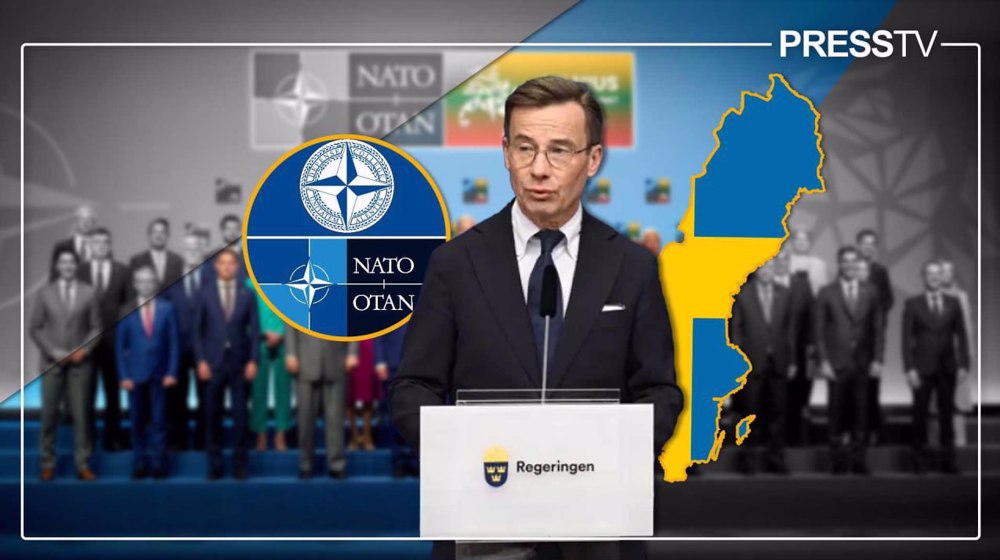By Ali Rezvanpour
After Turkey approved Sweden’s membership in the US-led NATO military alliance in January, Hungary was the last NATO member state to give its nod to the Nordic country’s ambitious bid.
The NATO membership of Sweden, which traditionally followed the policy of neutrality (not joining any bloc) and adhered to it even during the Cold War, has grabbed headlines in recent days.
With the membership of both Sweden and Finland finalized, Russian officials have warned of repercussions, publicly interpreting the move as an act of hostility towards Moscow.
In such a situation, two important questions arise: First, what is the reason for such a request from Sweden and Finland and what strategic consequences are going to follow now?
It would be safe to argue that although the Western media pushes the narrative that war between Russia and Ukraine is the only cause of concern for these two Northern European countries that prompted them to join the US-led military alliance, it is certainly not the whole truth.
Looking at strategic games played by global hegemonic powers from a wider perspective, we realize that amid changes in the strategy of the United States in recent years, especially viz a viz Persian Gulf as well as Russia and China, the effort to strengthen NATO as a counterweight to Russia and China, has been on top of Washington’s strategic plan.
Therefore, the expression of desire by these two Scandinavian countries to join NATO was not merely an internal decision based on their security needs. It was a foolhardy move engineered by the US.
The signing of a lucrative contract by Finland to purchase 64 F-35 aircraft from the United States in February 2021 is formidable proof that substantiates this claim.
Accordingly, with the joining of Sweden and Finland in NATO, the European Union in the form of NATO has announced a direct showdown against Russia and that is what Americans want.
In this way, with the expansion of NATO and the strengthening of the military power of the European part of NATO, the participation of Europeans in containing Russia will increase and the United States will be able to contain China with more readiness. That, however, will not be without an answer.
The second question is about the strategic consequences of the move by Sweden and Finland. It must be noted that this will lead to the expansion and strengthening of NATO and the narrowing of Russia’s encirclement ring and as a result, it will lead to an escalation of tensions in Northern Europe.
Although Finland and Sweden do not have a significant population and military budget, they have modern armies and a favorable military-technological industrial infrastructure and of course, in recent years, they have increased their military expenses due to the concern of Russia’s threat.
Russians consider the joining of Sweden and Finland to the bloc as a danger to regional stability, so an armed and political conflict between Russia and the Western Front cannot be ruled out.
Therefore, the expansion of NATO in new dimensions not only does not bring security and stability to European countries, but by pitting them against Russia and turning Europe into a tool for securing America’s goals and interests, it will disrupt the political and economic development of the Green Continent and turn Eastern and Northern Europe into a new crisis zone in the global geopolitical map.
Some Swedes worry that joining NATO will lead to a fundamental change in their national “identity”.
Sweden’s accession to NATO ended the country’s 200-year policy of international neutrality, which had established Stockholm as one of the mediators of peace around the world.
From former UN Secretary-General Dag Hammarshold’s efforts to promote peace in the Congo in the 1960s to Hans Blix’s role as the UN’s chief weapons inspector in the years leading up to the Iraq War, Sweden’s neutrality allowed this country to play an influential role in world conflicts.
Now, observers worry that Sweden’s accession to NATO will limit Stockholm’s options and force it to act in coordination with its allies, most notably the United States.
Based on this, the deployment of missiles capable of carrying nuclear warheads on Russia’s border with Finland and other European countries by the Kremlin, attacks on other European countries bordering Russia, cutting off exports or increasing the price of energy carriers as a means of pressure on European countries are some strategies that Russia may adopt in response to this decision.
The Russian Embassy in Sweden, in a statement recently, said the country “will take retaliatory measures of a political, military and technical nature in order to stop threats to its national security.”
The statement noted that Sweden’s accession to NATO would negatively affect the level of stability in Northern Europe.
The Kremlin has asserted that Russia poses no threat to its neighbors but will not ignore actions that are potentially dangerous to its national interests.
In addition, in recent years, Russia has pointed to unprecedented NATO activity near its western borders and has warned against the “containment of Russia” approach.
At the same time, Russian officials have repeatedly expressed their readiness for dialogue with NATO, but on an equal basis, while warning against the US-led process of militarizing the European continent.
On Monday, Russia slammed the military drills that are scheduled to take place across Finland, Sweden, and Norway in the coming days, saying the Russian military is monitoring it.
“Any exercises, especially [those] that are held geographically close to the contact line, increase the risk of military incidents. Therefore, all necessary measures have been taken in order to ensure the defense capabilities of Russia,” said Russia’s deputy foreign minister Alexander Grushko.
The coming months are going to determine which course the European continent takes and how costly Sweden’s accession to the US-led military alliance is going to prove.
Ali Rezvanpour is a Tehran-based political commentator and university teacher.
(The views expressed in this article do not necessarily reflect those of Press TV




